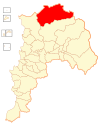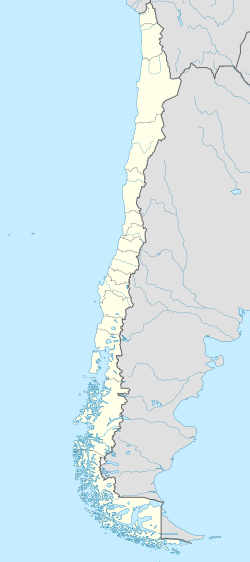Petorca facts for kids
Quick facts for kids
Petorca
|
||||
|---|---|---|---|---|
|
Town and Commune
|
||||
|
||||
| Country | ||||
| Region | ||||
| Province | Petorca | |||
| Government | ||||
| • Type | Municipality | |||
| Area | ||||
| • Total | 1,516.6 km2 (585.6 sq mi) | |||
| Elevation | 495 m (1,624 ft) | |||
| Population
(2012 Census)
|
||||
| • Total | 9,881 | |||
| • Density | 6.5152/km2 (16.8744/sq mi) | |||
| • Urban | 4,535 | |||
| • Rural | 4,905 | |||
| Sex | ||||
| • Men | 4,806 | |||
| • Women | 4,634 | |||
| Time zone | UTC-4 (CLT) | |||
| • Summer (DST) | UTC-3 (CLST) | |||
| Area code(s) | 56 + 33 | |||
| Climate | BSk | |||
| Website | Municipality of Petorca | |||
Petorca is a town and commune in Chile. It is located in the Valparaíso Region, specifically in the Petorca Province. The area of the commune is about 1,516.6 square kilometers.
For many years, Petorca has faced a big challenge: a long drought. This means there isn't enough water. This problem is made worse because a lot of the available water goes to farms, especially avocado farms, instead of to the people living there.
People of Petorca
A census is like a big count of all the people living in a place. In 2002, a count showed that Petorca had 9,440 people. Slightly more men lived there (4,806) than women (4,634).
About half of the people (4,535) lived in towns, which are called urban areas. The other half (4,905) lived in the countryside, known as rural areas. The number of people in Petorca grew a little bit between 1992 and 2002.
How Petorca is Run
Petorca is a commune, which is a type of local government area in Chile. It is managed by a group called the municipal council. The leader of this council is called an alcalde. The alcalde is chosen directly by the people every four years.
From 2012 to 2016, the alcalde of Petorca was Gustavo Valdenegro Rubillo. The municipal council also had several other members who helped make decisions for the commune.
Representing Petorca
People from Petorca also have representatives in the national government. These representatives speak for the commune in the Chamber of Deputies and the Senate. They are part of larger groups of communes that vote together.
See also
 In Spanish: Petorca para niños
In Spanish: Petorca para niños
 | Bayard Rustin |
 | Jeannette Carter |
 | Jeremiah A. Brown |



